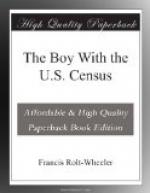“It is a pity,” the old man said, shaking his head, “and the worst of it is that even that ten per cent lives principally in the country. It’s the cities that influence the progress of the nation. We talk about making these foreigners over into our idea of what Americans should be, and we forget that all the time they are influencing us to become the kind of Americans they think we ought to be.”
“I guess that’s true,” the boy said, “because in New York, where my folks live, the old New Yorkers seem entirely strange and out-of-place in the dash and glitter.”
“Of course,” the New Englander replied. “The real Americans are plain, solid people; it’s the Jewish strain in New York that has brought about the display of wealth, and to the large number of Southern Europeans are due the colors, the lights, the music, the public dining, and all the rest of it. It may be the American of to-day, but it isn’t what Americanism meant a few years ago.”
“A good deal of New York life does seem foreign in a kind of way,” said Hamilton, “and I’m glad,” he added, as he closed his portfolio, “that the Census Bureau put me at work in one of the old-fashioned towns first.”
As the boy went on in his work he came to find how thoroughly the spirit of Yale was felt in the town. Almost all the leading business men were Yale graduates, and instead of displaying the “town and gown” hostility of some university places, New Haven was inordinately proud of its college. Of course, even in such a town, there was quite a proportion of foreign-born manufacturers but the boy found that the Jewish establishments were even easier to tabulate than those owned by Americans, the Hebrew understanding of the details of business being so thorough.
“That’s not so very detailed!” one of these remarked to Hamilton when the boy had come to the end of his list of questions.
“It’s a relief to hear somebody say that,” answered the young census-taker with a laugh, “because I hear a dozen times a day the complaint that no one could be expected to know as much about a business as these schedules require.”
It was not to be expected that the work would proceed without an occasional hitch, and Hamilton had one such with a firm of Italian marble-cutters in which the bookkeeping had been of so curious a character that it was next to impossible to get out the kind of figures the government wanted. Another was in a small Chinese place, where they made little trinkets to sell to tourists in the “Chinatown” districts of the larger cities, representing them to be imported articles of value. Another was with a small place run by two brothers, Persians, making fringes and tassels for fraternal order badges and matters of that kind. It was interesting to the lad, for he had the chance to see the works in a number of cases, and he learned a lot about the way many queer things were made.
But Hamilton’s hopes were set on visiting one especial manufacturing plant in New Haven, and he had determined to ask that he be allowed to go over it before he left the town. This was the great sporting gun works. Hamilton was passionately fond of sport, and had owned a Winchester ever since he was twelve years old. Indeed, he had read up on guns a good deal, and it was one of his hobbies.




